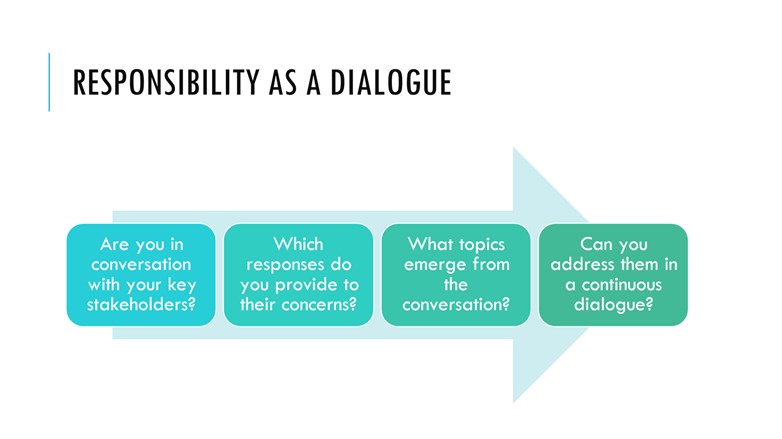From leadership talk to action - and impact? Our approach to Responsible Leadership is a dialogue
Responsible Leadership is not a style, it is rather a commitment to ethical behavior for economic, social and environmental considerations. Responsible leadership will aim to create positive outcomes for these three major areas of accountability.
At the Centre for Responsible Leadership (CRL) at SSE, we deliberate and actively explore in our ongoing dialogues with practitioners and policy makers questions such as what is responsible leadership? What do we need to think about in relation to responsible leadership?
Here some pointers we like to use as an inspiration for initiating a dialogue around this topic.
We believe that responsible leadership can be boiled down to three major aspects: Knowledge, stance, and response. It builds on (1) knowledge and continuous learning about our key stakeholders, (2) a willingness to engage with them, based on a reflected stance, and (3) our actions to create a positive outcome.
The three aspects of responsible leadership explained.
Elena: Responsible Leadership is often presented as the ability to respond. I think it’s more than that. When we add ‘responsible’ to the word ‘leadership’, we want to express more than a set of skills that enable leaders to address expectations.
Laurence: I agree, an ‘ability’ to respond doesn’t mean a will or a desire to answer. It’s only descriptive of an ability.
Katja: And the transformative and future creating part of leadership is not well captured by this focus on ‘ability’.
Elena: We miss the element of freedom, of choice to answer. A response is not a simple ‘reaction’ to a stimulus, it’s a deliberate act of answering.
Katja: Would we then say that responsible leadership is the ability and willingness to respond?
Elena: Yes, knowing that if you want to respond to something, you need to understand it, otherwise you may simply react.
Laurence: Hmm… and to reach this understanding, you need to respect others and be willing to learn. This starts to be a much more multifaceted definition than ‘ability to answer’!
Katja: And still not enough! We all have moments in which we could have engaged with something responsibly, let’s say, to correct an injustice, and yet looked the other way. The willingness to answer is not enough, you need to have something that will turn this willingness into action.
Elena: Bravo! You touch precisely on something that I call ‘activation’, that is the process that will make you act and thus answer, respond. This activation is closely related to taking a stance, knowing what you stand for.
Laurence: I recognize this from my work with diversity management. For example in a recruitment process with too few women, those who take a stance and act upon it, are those who know precisely why they act. They understand the situation of privilege and disadvantage of some groups. So, they know, and because they know, they can choose to act..
Katja: This brings us back to the idea of understanding…
Elena: Precisely. I think we can say that key elements of responsible leadership gravitate around notions of action and response, this means, understanding what is expected of us and understanding what our position is, our stance, what we stand for. This is why knowledge and learning are so central, in my opinion.
Laurence: Yes, responsible leadership as an informed and active answer…
Katja: that will improve a situation and lead to change, the change we know we want.

Katja Einola, Elena Antonacopoulou, Laurence Romani
